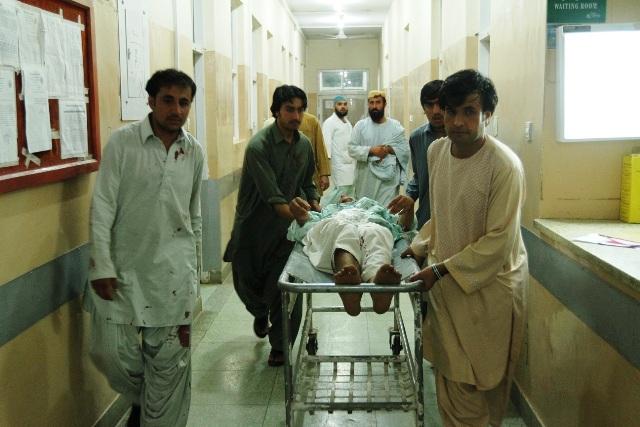KABUL (Pajhwok): Around a thousand people suffered casualties in the conflict in February when the fatality rate dropped by 43 percent compared to the previous month.
Pajhwok Afghan News reports show that February was the only month in the last two years when casualties fell unprecedentedly and no suicide attacks happened during the period.
In January 2018, about a thousand people were killed and more than 800 others wounded. But Pajhwok reports indicate 394 people were killed and 653 others wounded last month.
Considering the statistics, causalities decreased by 43 percent and attacks by 20 percent in February.
Pajhwok reports based on different sources show attacks happened in 27 of the country’s 34 provinces in February, when eight of every 10 victims suffered casualties in face-to-face fighting and one each in airstrikes, targeted attacks and blasts.
Pajhwok has been keeping track of monthly conflict-related casualties since August 2016. February was the only month when no suicide attacks happened.
Twelve attacks happened in Nangarhar, 11 in Helmand, 10 in Kandahar, nine in Ghazni and Sar-i-Pul each and the rest of 54 attacks occurred in 22 other provinces.
In February, there were no reports of casualties from Bamyan, Nuristan, Paktia, Paktika, Zabul, Kunar and Panjsher provinces.
Casualties
In February, 392 people were killed and 653 others injured. Rebels, security forces and civilians were among the casualties. But Pajhwok could not compile specific casualty figures because different sources provided different accounts.
But according to the Civilian Protection Advocacy Group (CPAG) report, 106 civilians were killed and 59 others injured across the country’s 17 provinces in February.
Last month, not a single day passed without attacks or casualties. But Pajhwok did not obtain reports of attacks on February 21 and 22.
February 16 was the deadliest day when 78 people were killed and 41 others wounded in different attacks.
Defence analysts link the rise and fall in casualties to a tactical approach toward fighting. Military experts believe greater casualties happen in more populated place in guerrilla warfare.
Experts tie the declining casualties in February to snowfall, cold weather and ongoing peace negotiations between the US and Taliban.
Maj. Gen. Mehrabuddin Safi, a retired army official, termed reduced casualties good news for all Afghans. He said any Afghan killed under any garb was painful.
“The main reason for reduced casualties is ongoing peace dialogue inside and outside the country. Peace negotiations directly cause a fall in casualties,” he added.
He added cold weather was another reason for fewer casualties.
Mirza Mohammad Yarmand, another retired general, held a similar view. “Ongoing peace talks caused both government and Taliban to reduce attacks. Fewer attacks cause fewer casualties,” he argued.
Afghan forces, supported by foreign troops, have been engaged in fighting the Taliban for the past 18 years. Past experience shows casualties and attacks surge in Afghanistan in the summer and decline in winter.
In 2017, around 25,000 people suffered casualties compared to around 27,000 people killed or injured in 2018. In the last two months of 2019, nearly 2,900 people have suffered casualties.
The conflict is taking the lives of Afghans while efforts for peace have recently been stepped up.
Afghans, more hopeful about the peace talks, have been asking the warring sides to agree on a ceasefire and stop killing civilians.
Samiullah Farooqi, a resident of Maidan Shahar, said: “Like me, all Afghans hope for positive results of peace talks. I want the warring sides to agree on a ceasefire and continue peace talks; it would prevent casualties.”
Ahmad Shoaib, a resident of Farah City, told Pajhwok he lost one of his brothers to a suicide attack two years ago. “Peace is a blessing. The Afghans are being killed on different pretexts for the last four decades. Our life is really painful.”
Shoaib said whenever he entered home and saw his orphaned nephews his pain recurs. He thinks all Afghans — soldiers, Taliban or civilians — who lose relatives to the war would have the same feelings.
Shoaib asked parties to the conflict not to lose the present opportunity for peace and be ready for sacrifices to end bloodshed by making the peace process a success story.








GET IN TOUCH
NEWSLETTER
SUGGEST A STORY
PAJHWOK MOBILE APP